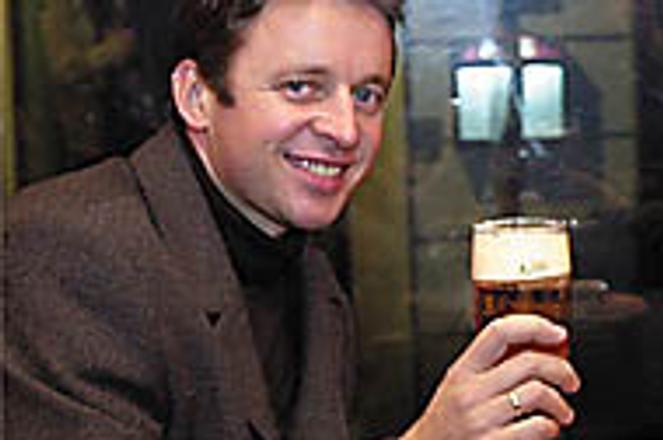Deputy Prime Minister Ivan Mikloš (left) and Prime Minister Mikuláš Dzurinda celebrate April 19 after the former's decision to join the SDKÚ partyphoto: TASR
Deputy Prime Minister Ivan Mikloš, a free-market advocate whose name has become synonymous with reform of Slovakia's economy, has cast in his lot with Prime Minister Mikuláš Dzurinda's non-parliamentary SDKÚ party. Political analysts have doubted whether the popular reformer Mikloš will be able to halt the SDKÚ's slide in the polls.
In a decision announced April 19, Mikloš said he had abandoned his status as an indepedent politician and joined the SDKÚ because he wanted "to continue in politics".
The SDKÚ was launched as a non-parliamentary party in February 2000 after Dzurinda, head of the five-member Slovak Democratic Coalition (SDK), opted to strike out on his own rather than fight for authority within the SDK, the strongest of Slovakia's ruling coalition parties. In forming the SDKÚ, he drew the support of five cabinet members, with the notable exception of Mikloš.
Since its formation, the SDKÚ has fallen from 16% support in popularity polls to its current 10%.
The decision of Mikloš to sign up was greeted with evident joy by Dzurinda. "I think this is great news for Slovakia that Ivan Mikloš has decided to continue in politics and join the SDKÚ," he said.
For Dzurinda, the SDKÚ represents a 'fusion' of Slovakia's centre-right politicians that could act as a counterweight to former PM Vladimír Mečiar's HZDS party, which although in opposition has led voter preference polls since the last national elections in 1998 at an average support level of 25%. Mikloš, for Dzurinda, represents a significant contribution to the SDKÚ's chances to defeat Mečiar.
But analysts say that the political capital wasted in establishing the SDKÚ - at the cost of plummeting support for Slovak Democratic Coalition member parties - cannot be regained even by recruiting Mikloš.
"Mikloš is popular, so we can expect that in himself he will bring a few percent to the SDKÚ," said Sona Szomolányi, head of the political science department at Bratislava's Comenius University. "But on the other hand, the popularity of a politician does not always translate into support for his party."
What Mikloš brings, offers
In the days after Mikloš's accession to the SDKÚ, observers speculated as to what the connection could bring the Deputy PM - who as a reformer, political scientist Grigorij Mesežnikov said, had become "an institution within the government" - and what Mikloš could possibly gain from the association.
Szomolányi expected that Mikloš would gain more support in pushing through reforms than he had enjoyed as an independent or as a member of the tiny Democratic Party (DS), which he abandoned in December last year.
"His was a rational decision [to join the SDKÚ] because he understood that he needed strong political support to force through reform steps, not the backing of a party [the DS] with 2% voter preferences," she said.
Having ushered through painful price deregulation and banking sector reform since 1998, Mikloš still hopes to champion major changes to Slovakia's health sector, school system and regional government apparatus.
Mesežnikov agreed that the SDKÚ had been Mikloš's only choice if he wished to see his reform agenda fulfilled. "The SDKÚ at the moment is the only party where Mikloš could pursue his reforms," he said.
Apart from the small increase in support that the Deputy PM might bring Dzurinda's pre-election team, the most important influence he may have on the SDKÚ is to tone down its pyrrhic warfare with the parties which formed the Slovak Democratic Coalition, the SDKÚ's predecessor.
"He'll add [to the SDKÚ's popularity], but far more importantly, he'll influence the SDKÚ's behaviour towards its coalition partners," said Mesežnikov.
The SDK, which took 26.3% in 1998 elections, was rocked by squabbling between its five members in the following year. In abandoning the SDK and forming the SDKÚ, analysts say Dzurinda adopted a 'divide and conquer' approach to the SDK member parties, the choice being for politicians to join the larger SDKÚ, or remain with the foundering SDK parties.
The dilemma led in 1999 and 2000 to the break-up of the Democratic Union and Democratic Party, and the departure of the Christian Democrats - and to tumbling voter support for all involved in the fight.
But as 2002 elections approach, analysts hope the politically more moderate Mikloš may be able to smooth over troubled waters.
"Mikloš is an advocate of coalition [between the separate SDK parties] rather than assimilation, so maybe he will be able to convince Dzurinda that the future of the SDKÚ is in coalition with the Christian Democrats and Democratic Party," Mesežnikov said.
That may be easier said than done. The Democratic Party, for instance, is in chaos after its leadership was won by Mikloš protegé Ľudovít Kaník, with former DS member of parliament Peter Tatár saying that "in joining the SDKÚ Mikloš gave the DS a clear signal they should follow his example."
Kaník, meanwhile, called Tatár's claim "stupid rumour-mongering", and said the DS had a "keen interest" in coalition relations with the SDKÚ.
In the end, if Mikloš's joining the SDKÚ works out as intended, the Prime Minister's new party will gain strong right-wing support and a boost for reforms the government has advocated. But if not - if the reforms don't show results soon to a frustrated public, or if political bickering continues within the SDK - Mikloš may find he has paid a high price for finally throwing his hat in the ring.
"If the SDKÚ doesn't convince more voters, the whole project will collapse and Mikloš after 2002 elections will become an opposition politician," said Mesežnikov.
Having served as Privatisation Minister in the early 1990s, Mikloš remained a non-parliamentary member of the Democratic Party until his election in 1998.
"I can't imagine his as an opposition MP," said Mesežnikov,


